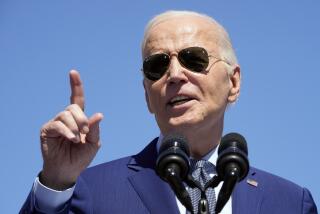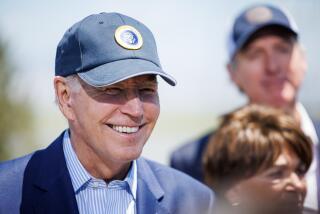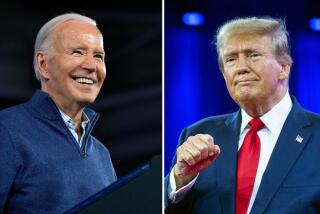Gore Drifts While Bush Sets Agenda
Defying early expectations, Republican George W. Bush has seized the upper hand in the race for president by laying out a broad issues agenda that has driven the campaign debate and thrown his more seasoned rival on the defensive.
Democrat Al Gore’s campaign, in contrast, has seemingly drifted, doing little to define his own candidacy. He has spent the last two months railing against what he describes as Bush’s “risky” proposals--so far to no great effect. Thursday night, responding to rumblings within his own party, Gore met with Democratic leaders from around the country to reassure them about his campaign.
It is a scenario few would have imagined just months ago, back when Bush’s stumbling performance in the early candidate debates led even some fellow Republicans to question his intellect and preparedness for the White House.
Lately, however, Texas Gov. Bush has appeared in command of both the facts and the rhythms of the campaign. And this time it’s Democrats who are growing nervous, fretting that their presumptive nominee, Vice President Gore, seems shrill.
“Bush is setting the agenda right now,” said Democratic pollster Fred Yang. “He’s making us react to him. . . . I do worry a little bit that we start coming across as too negative. Negative works, obviously, [but] you need to tell people some reasons why you should be president of the United States.”
Which is just what Bush has been doing. Over the last week, with a series of carefully choreographed policy announcements, the governor has seemed the very model of statesmanship and sure-footedness. He parted company with the Republican Congress on the thorny issue of Kosovo, declaring that lawmakers should not set a deadline for the withdrawal of American troops.
He joined ranks with President Clinton--and rival Gore--over normalizing trade relations with China, saying lowered barriers would benefit American workers and farmers and give the Chinese “the hope of more open contact with the world of freedom.”
He has campaigned in recent weeks with a brace of Texas Democrats and met with Democratic Sen. Bob Kerrey of Nebraska to discuss Social Security reform. While Gore strategists believe Social Security could ultimately prove Bush’s undoing, the meeting with Kerrey and kind words from Democratic Sen. Daniel Patrick Moynihan of New York provide Bush some political cover.
Moreover, his hands-across-the-aisle campaign style has underscored Bush’s recent pledge that “as president I will work with the Republican leadership and reach out to Democrats, as I have in Texas.”
At the same time, Bush has stepped up efforts to erase what critics call his most glaring weakness: a lack of experience in international affairs. In back-to-back foreign policy speeches this week, he criticized the Clinton administration’s handling of the Middle East peace process.
And he called for a new arms control policy that would include deep cuts in nuclear weapons, as a clutch of foreign policy Brahmins--Henry A. Kissinger, Gen. Colin L. Powell and George P. Shultz among them--looked on approvingly.
Chris Lehane, a Gore spokesman, dismissed Bush’s recent policy pronouncements as “a cynical effort to try to appear less extremist. . . . Compared to Al Gore on the substance, it’s a night-and-day contrast.”
But for now, at least, recent polls have shown that Bush’s initiatives and the subsequent media coverage have resonated. The Texan enjoys broad support among nearly all pockets of the electorate, including such traditional Democratic strongholds as female voters.
“When you look inside at surveys on why people like and support him, it’s his father, his family, that he’s been a good governor,” said Scott Reed, who managed former Sen. Bob Dole’s 1996 White House bid. “By rolling out these policy initiatives in a successful and disciplined way, he’s been able to put that meat on the bones, and he’s done so very well.”
Gore Struggles to Define Himself
All of this has placed Gore in the uncomfortable position of having to respond to Bush on the Texan’s terms. Perhaps worse still, a month after the Gore campaign promised to roll out a string of policies and political moves to spark his sluggish campaign, the vice president is now struggling with an image as a political slasher.
His approval ratings are lagging in the polls. He canceled most of a vacation planned for last week so that he would not fall from the headlines. His high-level strategists have been huddling to figure out the right combination of attacking his opponent and defining himself.
Ari Fleischer, press secretary for the Bush campaign, said American voters have “turned a corner” and want a leader who appeals to them on policy, not pugnacity. “This election will test whether or not nightly polls and daily attacks will trump long-term vision and leadership by Gov. Bush,” Fleischer said.
But the Gore camp finds consolation in several areas. First, they point to polls they say show voters liking Bush but agreeing with Gore on issues such as Social Security, education and health care. And they argue that it’s so early in the race that this fallow time between the primaries and general election won’t matter come November, by which time both candidates will be far more familiar.
Voters “have got to come to know our candidate at a much higher level than they know now,” one senior strategist said. “His values, what motivates him, his experience in life and what lays at the heart of what he cares about. That will come particularly around the conventions, and we have a lot of paid media to do that. . . . We have to give that to [voters] before we can ask them to support him the way we want them to.”
Gore plans to use a pair of speeches over the Memorial Day weekend to highlight his experiences as a military journalist in Vietnam. Separately, the Democratic National Committee is planning to spend millions of dollars on biographical TV ads from now to the party’s nominating convention in August.
At the same time, Democrats figure the two candidates have very different skills, which will make them successful at different parts of the campaign--Bush now, Gore later, when they say it really matters.
Waiting for Gore at His Fighting Best
Bill Carrick, a Los Angeles-based Democratic strategist, conceded that Bush does best in quiet times like these, when he can stage “media events designed to create very positive visual images and talk about middle-of-the-road, middle-class concerns.” But just wait until things heat up again, Carrick said, when there’s charge and countercharge and Gore is at his fighting best.
Gore “does very well in the competitive part of the campaign,” Carrick asserted. “Fortunately for Gore, the part of the campaign he does the best in happens late. Unfortunately, the bad part of the campaign where he’s not as skilled as Bush is happening now.”
But Stuart Rothenberg, editor of a Washington-based political newsletter, is skeptical. Yes, fellow Democrat Bill Bradley withered under Gore’s attack in the primaries. But there’s no assurance that it will happen again.
“Bush may not be as ineffectual in responding as Bill Bradley was,” Rothenberg said. “Bush has some significant assets. . . . [He] looks a little better to me than I think many partisan Democrats are willing to admit at this point.”
And Gore? Every day the vice president looks like “his major goal is to attack Bush,” Rothenberg said, “and I don’t think that’s a particularly good image to have for rank-and-file voters.”
For his part, the vice president believes that over time his message and his stands on the issues will get through to voters and prevail. But the process of persuasion is a slow one, he said during a “radio town hall” meeting earlier this week in Washington, and it “is not best analyzed on a daily or hourly basis.”
Flying to Memphis, Tenn., late Thursday night after his meeting in Nashville with Democratic leaders, Gore discounted current polls and reiterated his long-range optimism.
“I think it’s a mistake for anybody to base their entire view of what the American people are thinking in the year 2000 on the basis of these snapshot polls,” Gore said aboard Air Force Two.
“I feel great about the campaign.”
*
Times staff writer Stephen Braun contributed to this story.
More to Read
Get the L.A. Times Politics newsletter
Deeply reported insights into legislation, politics and policy from Sacramento, Washington and beyond. In your inbox three times per week.
You may occasionally receive promotional content from the Los Angeles Times.








